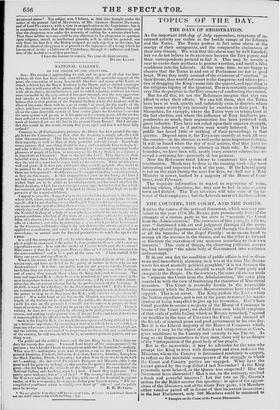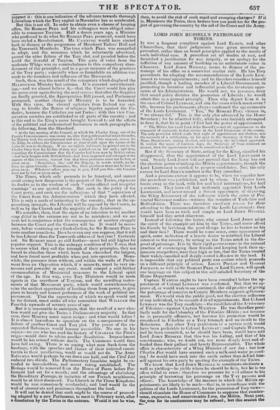THE COUNTRY, THE COURT, AND THE TORIES.
AMONG the causes of the national discontent, which was very pre- valent in the year 1770, Mr. BURKE puts prominently forum rd the attempts of a certain party in the state to "separate the Court from the Administration." The creatures of this party, he tells us, were " distributed with art and judgment through all the secon- dary but efficient departments of office, and through the houseko/ds of all the branches of the Royal Family; so as on one hand to occupy all the avenues to the throne, and on the other to forward or frustrate the execution of any measure according to their own interests." This state of timings, the observing politician assures us, had brought " the whole body of Government into ccnfusicu andcontempt." If in our own day the condition of public affairs is not so disas- trous and immediately alarming as it was at the time Mr. BURKE wrote his most masterly political pamphlet,* it is not because the same mans have not been adopted to exalt the Court party and exasperate the People. On time contrary, time same efforts are made to " separate the Court from the Administration," the same plan resorted to with the view of frustrating the execution of Ministerial measures. The Court is avowedly hostile to the responsible Government which the National Representatives have resolved to support. This is no secret. The King prefers time Tom acs whom the Nation repudiates, and is not at time pains to conceal his morti- fication at being compelled to give up his favourites. Had it been found possible to secure a majority of the House of Commons in favour of the Court party, we should have soon beheld symptoms of that state of public feeling which as BURKE remarked, " opened our troubles in the time of CHARLES the First," and alarmed all the friends of internal peace and good government in his own day. But it is the Liberal majority of the House of Commons which, however it may be the object of hatred and vituperation at Court, gives confidence to the Country and security to the Throne. As long as cur Representatives do their duty, there will be no danger of the "interposition of the great body of the people." But in the meanwhile, it may be advisable for the men who prompt the King to treat with disrespect and even rudeness the Ministers whom the Country is determined resolutely to support, to reflect on the inevitable consequence of the struggle in which the Court and Country parties are engaged. What have the termer gained by the coup did& of last November? Is time King personally more beloved, or the Queen less suspected ? has the Movement been obstructed ? Has it not, on time contrary, received a fresh and powerful impetus ? Let the vote on Mr. GROTE S motion for the Ballot answer this question : in spite of the opposi- sition of the Ministers, and of the whole Tory party, 170 Members either voted or paired off in favour of that important innovation; in the last Parliament, only 108 Members could be mustered to
• Thoughts on the Cause of the Present Discontents.
support it : this is one indication of the advance towards thorough
Liberalism which the Tory exploit in November has so accelerated.
But this isnot all. In order to obtain even a chance of keeping office, Sir ROBERT PEEL and his colleagues were obliged osten- sibly to renounce Toryism. Half a dozen years ago, a Minister who professed to do what Sir ROBERT PEEL promised, would have been styled a Revolutionist. Mr. CANNING would have started back in dismay at the programme of Merchant Tailors' Hall and the Tamworth Manifesto. The tone which PEEL was compelled to adopt, and the measures which he reluctantly advertised, proved the utter failure of the Tory plot, and paraded before the world the downfal of Toryism. The gain of votes from the moderate Whigs was no counterbalance to this compulsory aban- donment of the principles, and in a great measure of the practices of the Tory party; especially when so formidable an addition was made to the numbers and influence of the Movement.
Such, then, was the result of the conspiracy which displaced the MELBOURNE Ministry last autumn. It is asserted notwithstand- ing,—and we almost believe it,—that the Court would fain play the game over again during the next recess; that after the Supplies are finally granted, the Appropriation Bill passed, and Parliament prorogued, another change of Ministry is to be hazarded. With this view, the clerical agitators from Ireland are Mai- ving to kindle the flames of religious bigotry against the Ca- tholies, because the Catholics are not Tories : with this view Con- servative societies are established in all parts of the country : and to this end is the King's name brought forward to aid the efforts of the political and ecclesiastical factionists in such paragraphs as the following, from the Standard.
" At the late meeting of the Council, at which Sir Charles Grey, one of the Canada Commissioners, was sworn in, after that gentleman had taken the oaths, his Majesty took the constitutional and wise, though of late unusual, courbe fur the King, to address the Commissioner at some length upon the nature of the ditties he was to discharge. If we are rightly inhumed, he pointed out to Sir Charles Grey how far lusline of duty was marked out in his oath ; and then, reminding time Commissioner that the Canadas had been won by British valour —bad been bought with British Mood—bad been improved and enlarged at the expense of this country, warned bins that these provinces insist not he lost, or
given away. Remember, Sir,' said his Majesty, in words which, we be- lieve, we quote literally= Remember, Sir, these provinces must not be lost, or given away. Whatever others may say to you, I tell you this—the Canadas must not he lost or given away."' The Times, which only pretends to be fanatical, and cannot avoid seeing how dangerous is the project of the Tories, expresses its doubts as to the wisdom of such " extra-official and irregular warnings" as are quoted above. But such is the policy of the Court rule, and such are the indications of that " separation of the Court from the Administration" which they have effixted. This is only a mode of intimating to the country, that in the ap- proaching struggle, the Liberals will be opposed by the Crown, as well as by the Church and the majority of the Aristocracy. We consider, then, that the signs of an intention to try another coup d'etat in the autumn are not to be mistaken; and we are next led to conjecture what the consequence of another struggle between the Court and the Country will be. It would be neces- sary, before venturing on afresh election, for Sir ROBERT PEEL to issue another manifesto. Does he or can any one suppose, that it will be less Liberal than the Tamworth address of last year? Certainly not. Sir ROBERT must go still further—must bid still higher for popular support. This is the unhappy condition of the TI ries, that to secure what they call the triumph of their principles, they ate forced to abandon those which have been cherished the longest, and been found most profitable when put into operation. Mean- while, the pressure from without, and within the walls of Parlia- ment from an Opposition which, if a minority, must be very nu- merous and powerful in any event, would compel a still further accommodation of Ministerial measures to the Liberal spirit of the age. In this way, even Tory Ministers would be made agents in the overthrow of Toryism, and the unwilling instru- ments of that Movement party, which would notwithstanding seize the earliest opportunity of hurling them from power, to give place to hearty and honest performers of the work of political im- provement. That the opportunity of which we speak would not be far distant, must strike all who remember that WILLIAM the Fourth is upwards of seventy years of age. But it is reasonable to anticipate, that the result of a new elec- tion would not give the Tories a Parliamentary majority. In that case, their Ministry must again resign : and what would fellow ? It is almost hazardous to speculate on the consequences of the failure of another Court and Tory plot. The power of the ex- asperated Reformers would become irresistible. No one in his senses—no one who has read the history of CHARLES the First's reign—would dare to advise another dissolutiou. Impeachment would be his reward without doubt. The Commons would then have full swing. There is no saying what men fresh from the hustings, with the speeches and cheers of their irritated consti- tuents in their recollection, would or would not do. The Army Estimates would perhaps be cut down one half, and the Civil List reduced two thirds. The Parliamentary franchise might be ex- tended to householders, and secret voting established. The Bishops would be removed from the House of Peers before Par- liament had sat for a month ; and the advantage of abolishing the Hereditary ,Peerage, in imitation of our French neighbours, would be at least discussed. The Church in the Three Kingdoms would be unc remouiously overhauled ; and loud would be the wail of sinecurists and pensioners throughout the land.
It will not be denied that such might be the course of proceed- ing adopted by a new Parliament, to meet in February next, after a dissolution by the Tories in the autumn. Would it not be wise, then, to avoid the risk of such rapid and sweeping changes?' If it is, Messieurs the Tories, then beware how you push too far the pro- ject of governing the country by the aid of the Court and the Army.



























 Previous page
Previous page